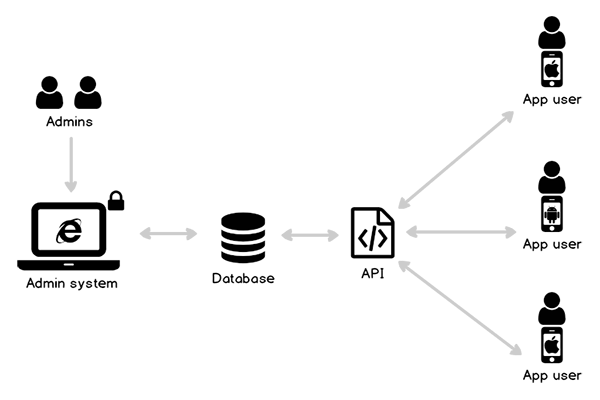Two apps not one
Unless you know that your target audience will exclusively use an iPhone or exclusively use an Android phone, you're likely to need two apps not just one.
While they may be designed to accomplish the same task, an iPhone app and an Android app are fundamentally different things and so an app development project is usually two projects!
Ideally, you'll find an app developer or an agency able to do both apps for you but you may need to use different suppliers for each app, which will create a project management overhead that you could probably do without.
It's probably not just an app that you need
Your apps won't look the same
An iPhone app has a natural feel to it. iPhone apps have a familiar look and an iPhone user has developed an intuition for how their apps should work.
The same is true for Android users, who are familiar with how apps on their phone typically present themselves.
But the two environments are different. If you were to compare your app running on an iPhone with your app running on an Android device, they won't look identical! iPhone users expect tabs to appear across the bottom of the screen, where as an Android user would look for this at the top. And certain controls, such as toggle switches, look different too.
There are costs with Apple and Google
Both app stores (the App Store and Google Play) will require you to set up a developer account before you can publish your app and there's a cost involved. Currently, Google charges $25 as a one-off setup fee for your Google Developer account whereas Apple charges £79 per year for the equivalent.
Apps can be private
Even though you might want to publish your app in the two app stores (as this provides users with the most convenient way to find and install your app), those apps don't have to appear to the public.
If you're developing an app for a defined group of people – employees, for example – it might be more appropriate for your app store listing to be private, in which case you can restrict your app's availability only to user to whom you provide your app's store URL.
It's probably not just an app that you need

Most business apps depend on a central admin system or database with which they send / receive data.
The admin system will be hidden from the app user's view but any meaningful interaction in the app will relay data back to the this central point.
So unless your app is entirely self-contained and a user can access the app without needing to login, you will likely need your developer to provide a database or admin system as well as your iPhone and Android apps.
Business apps are for small, niche areas of functionality
As we're accustomed to using "super apps" such as Facebook, it's easy to forget that most business apps are much smaller operations. Instead of being huge, enterprise-level applications like Facebook, successful business apps often offer specific functionality which fulfils a niche requirement for its users.
A good starting point is to consider your existing business processes that suffer from one or more of these symptoms:
- slow
- paper-based
- requires someone to copy or transcribe data from one place to another
- requires human intervention to communicate data
An app might be the solution that you need. Often, you can identify the potential for an app by talking with your most important stakeholders: customers and employees.
Which processes do they find tiresome, unreliable or protracted. What wastes their time?
Each area of pain for them is an opportunity for you to improve the efficiency of how your business works while building loyalty, which will help repeat business and employee retention.
Marketing is often the key
If your app is for a discrete audience, such as employees, you will need to promote your app without relying on the app store, as private apps will not appear in any search results.
But if your app is for public consumption, expect to need to spend some time working on the presentation of your app's page in the app store. As a minimum, you will need:
- a well-written, engaging description of your app
- multiple screenshots of your app running on an iPhone and on a Google device (and, in case you were wondering, Apple isn't likely to accept screenshots of your app showing it running on a non-Apple device!)
- an accurate and up-to-date privacy policy
